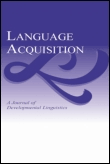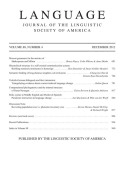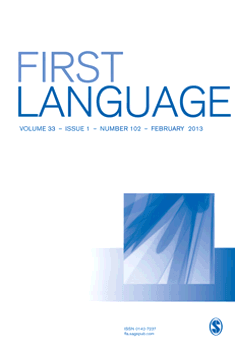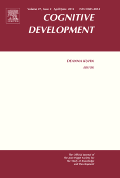
Language Acquisition
Scope & Guideline
Shaping the future of linguistics and educational psychology.
Introduction
Aims and Scopes
- Child Language Development:
The journal emphasizes empirical studies that explore how children acquire linguistic structures, including syntax, semantics, and morphology, often through experimental and observational methodologies. - Bilingualism and Multilingualism:
Research focusing on how children acquire multiple languages, the effects of bilingualism on cognitive development, and the unique challenges faced by bilingual learners. - Language Disorders and Impairments:
The journal includes studies on developmental language disorders, autism spectrum disorders, and other impairments, analyzing how these conditions affect language acquisition and processing. - Input and Interaction:
A core area of focus is on the role of language input, parental interaction, and social context in shaping language development, with studies examining how different types of input influence acquisition outcomes. - Cross-Linguistic Perspectives:
The journal publishes comparative studies across different languages, providing insights into universal and language-specific patterns in language acquisition. - Cognitive and Social Influences:
Research examining the intersection of cognitive development, theory of mind, and social interaction in language learning, highlighting how these factors contribute to the acquisition process.
Trending and Emerging
- Neuroscience and Language Acquisition:
Recent publications indicate a growing interest in the relationship between neuroscience and language acquisition, exploring how brain development affects language learning processes. - Technology and Language Learning:
The incorporation of technology in language acquisition studies is on the rise, with research examining how digital tools and media influence language learning outcomes, particularly in children. - Interdisciplinary Approaches:
There is an increasing trend towards interdisciplinary research that combines insights from psychology, cognitive science, and linguistics to provide a more holistic understanding of language acquisition. - Language Acquisition in Diverse Contexts:
Emerging themes include the study of language acquisition in diverse cultural and social contexts, highlighting the effects of sociolinguistic factors on language development. - Focus on Heritage Languages:
An uptick in research surrounding heritage language acquisition reflects a growing recognition of the importance of maintaining linguistic diversity and understanding the unique challenges faced by heritage speakers.
Declining or Waning
- Traditional Syntax and Morphology:
Research specifically focused on traditional syntactic and morphological frameworks appears to be waning, as newer studies often incorporate more dynamic and interdisciplinary approaches to understanding language acquisition. - Narrow Language-Specific Studies:
There seems to be a declining interest in studies that focus solely on one language without comparative or cross-linguistic perspectives, as the field increasingly values insights drawn from multiple languages. - Static Models of Language Processing:
There is a noticeable reduction in the publication of studies that utilize static models of language processing, with a shift towards dynamic models that account for variability and change in language acquisition.
Similar Journals

Suvremena Lingvistika
Connecting Scholars and Ideas Across Linguistic Landscapes.Suvremena Lingvistika is a distinguished open-access journal published by the Croatian Philological Society, dedicated to advancing research in the field of linguistics and language. Since its establishment, the journal has been pivotal in promoting scholarly dialogue within the linguistics community, especially among researchers and academics in Croatia and beyond. With an ISSN of 0586-0296 and an E-ISSN of 1847-117X, the journal has transitioned to an open-access model since 2007, ensuring that research is freely accessible to all. As of 2023, it holds a respectable Q3 ranking in the Linguistics and Language category, reflecting its potential contribution to the field. The journal's scope encompasses a wide array of linguistic disciplines, encouraging both theoretical and empirical studies. Supportive of new research, Suvremena Lingvistika aims to foster innovative approaches and methodologies in linguistics, making it an essential resource for students, researchers, and professionals eager to explore the complexities of language. With its ongoing publication until 2024, it continues to shape the linguistic landscape, providing valuable insights and fostering collaboration among scholars globally.

SKASE Journal of Theoretical Linguistics
Fostering Collaboration in Theoretical LinguisticsSKASE Journal of Theoretical Linguistics, published by the SLOVAK ASSOCIATION STUDY ENGLISH-SKASE, is a distinguished Open Access journal that expands the horizons of linguistic research and theoretical frameworks. With its ISSN N/A and E-ISSN 1336-782X, the journal has established itself as a pivotal resource for scholars in the field, achieving a commendable Q2 ranking in Linguistics and Language as of 2023. The journal, which has been in continuous publication since 2017, actively publishes innovative research studies, reviews, and theoretical discussions, easing access to groundbreaking work for academics and practitioners alike. Based in Slovakia, it connects a rich heritage of linguistic scholarship and is indexed in Scopus, ranking alongside its peers in both Arts and Humanities and Social Sciences categories. The SKASE Journal of Theoretical Linguistics is crucial for anyone interested in the evolving landscapes of linguistics, serving as an invaluable platform for disseminating knowledge and fostering collaboration amongst researchers worldwide.

LANGUAGE
Exploring the Depths of Language and TheoryLANGUAGE, published by the Linguistic Society of America, is a premier academic journal dedicated to the rigorous study of linguistic theory and practice. With an ISSN of 0097-8507 and E-ISSN 1535-0665, this esteemed journal has established itself as a leading publication in the field of linguistics since its inception. The journal has consistently maintained a high impact factor, being ranked in the Q1 category in Linguistics and Language for 2023, placing it among the top tier of academic journals. Notably, it also holds impressive Scopus rankings, being positioned at #75 out of 1088 in Arts and Humanities, and #89 out of 1167 in Social Sciences, demonstrating a significant impact and reach in the discipline. While it is not an open-access journal, LANGUAGE provides crucial insights into linguistic research, fostering a vibrant academic community. Spanning years from 1996 to 2024, it continues to be an essential resource for researchers, professionals, and students alike, aiming to advance the understanding of language in its myriad forms and functions.

First Language
Connecting Scholars Through Language ResearchFirst Language is a prestigious journal dedicated to the study of language acquisition, development, and use, published by SAGE Publications Ltd. With an ISSN of 0142-7237 and E-ISSN 1740-2344, this journal has been a vital resource in the fields of Education and Linguistics since its inception in 1980. It proudly holds a 2023 Q1 ranking in Linguistics and Language and a Q2 ranking in Education, underscoring its significant impact and contribution to these dynamic fields. Positioned in the 91st and 90th percentiles in Scopus rankings for Language and Linguistics and Social Sciences, respectively, First Language attracts a global readership, fostering rigorous scholarly discussion and exploration. The journal is not Open Access, ensuring that its curated content maintains a high level of academic integrity and exclusivity. With a rich historical scope extending to 2024, First Language serves as an essential platform for researchers, practitioners, and students committed to advancing our understanding of language in all its complexities.

Rivista di Psicolinguistica Applicata-Journal of Applied Psycholinguistics
Unlocking the Secrets of Communication.Rivista di Psicolinguistica Applicata - Journal of Applied Psycholinguistics is a distinguished journal dedicated to exploring the intersections of psychology and linguistics, making significant contributions across various subfields of psycholinguistics and its applications. Published by Fabrizio Serra Editore in Italy, this journal presents a repository of innovative research, theoretical advancements, and practical applications relevant to developmental and educational psychology, linguistics, and social psychology. Although currently listed in Q4 for Developmental and Educational Psychology and Q4 for Social Psychology, the journal has achieved a respectable Q3 ranking in Linguistics and Language, reflecting its commitment to enhancing understanding within these realms. With an E-ISSN of 1724-0646, the journal facilitates accessibility to its content, empowering scholars and practitioners to stay abreast of emerging trends and findings. The impact factor of the journal is poised for growth as it seeks to amplify its reach and influence within the academic community, appealing to researchers, professionals, and students who have a vested interest in the dynamic field of applied psycholinguistics.

Acta Linguistica Academica
Exploring the Frontiers of Language and CultureActa Linguistica Academica is a distinguished academic journal published by Akademiai Kiado ZRT, located in Hungary. Since its inception in 2017, the journal has occupied a premier position in its field, achieving Q1 rankings in both Cultural Studies and Linguistics and Language, as well as in Literature and Literary Theory in 2023. With an impressive Scopus ranking placing it in the top percentiles across various categories, Acta Linguistica Academica stands out as a vital resource for researchers, professionals, and students dedicated to exploring the nuances of language, literature, and cultural dynamics. The journal provides a platform for high-quality research and diverse perspectives, facilitating the dissemination of innovative ideas and comprehensive analyses in these disciplines. As an esteemed open-access journal, it ensures that cutting-edge research is readily available to the academic community and the public at large, affirming its commitment to accessibility and knowledge sharing.

Annual Review of Linguistics
Exploring the Frontiers of Language ResearchAnnual Review of Linguistics is a premier scholarly journal dedicated to advancing the field of linguistics through comprehensive and insightful reviews of current research and emerging trends. Published by ANNUAL REVIEWS, this journal is recognized for its high impact, evidenced by its Q1 ranking in the Linguistics and Language category and exceptional placements in the Scopus Ranks, positioning it in the top 2% of its field. Since its inception in 2015, the journal has served as a vital resource for researchers, professionals, and students seeking to deepen their understanding of language theories, acquisition, processing, and sociolinguistics. With no Open Access currently available, the Annual Review of Linguistics is esteemed for its rigorous peer-reviewed articles that synthesize a wealth of knowledge, making it an indispensable tool for advancing research and dialogue within the linguistic community.

Glossa-A Journal of General Linguistics
Connecting Scholars in the World of LinguisticsGlossa: A Journal of General Linguistics, published by the Open Library of Humanities, stands as a leading voice in the realm of linguistic research since its inception in 2016. With its Q1 category ranking in Linguistics and Language and impressive Scopus ranks encompassing the top 83rd and 81st percentiles in its respective fields, Glossa fosters a vibrant academic community committed to the rigorous exploration of language and linguistic theory. Operating under an open access model, the journal not only enhances the visibility of groundbreaking research but also ensures that valuable insights are accessible to a global audience. The journal's commitment to interdisciplinary dialogue makes it an indispensable resource for scholars, professionals, and students eager to engage with contemporary developments in linguistics. As it converges into 2024, Glossa continues to champion innovative scholarship and critical discourse that challenges conventional boundaries within the field.

Lingue e Linguaggio
Unveiling the Nuances of Language and CommunicationLingue e Linguaggio, published by SOC ED IL MULINO, is a distinguished academic journal in the field of Linguistics and Language, hailing from Bologna, Italy. With an esteemed Q2 ranking in its category as of 2023, this journal is recognized for its contributions to both the arts and humanities as well as social sciences, achieving notable positions within Scopus rankings. It serves as a vital platform for researchers, practitioners, and students interested in exploring various linguistic phenomena, language dynamics, and theoretical frameworks. Although it operates under a traditional subscription model rather than open access, its comprehensive array of studies and publications provides significant insights and fosters academic discourse. With a publication period extending from 2002 to 2024, Lingue e Linguaggio continues to be a key resource for advancing the understanding of language in contemporary contexts.

COGNITIVE DEVELOPMENT
Unraveling the Mysteries of Cognitive ProcessesCognitive Development is a prestigious academic journal published by Elsevier Science Inc, focusing on the critical area of developmental and cognitive psychology. With an ISSN of 0885-2014 and an E-ISSN of 1879-226X, this journal serves as a vital platform for the dissemination of innovative research, theories, and methodologies from 1986 to the present, with the latest articles contributing to a comprehensive understanding of cognitive processes in children and adolescents. Positioned in the second quartile (Q2) of both the Developmental and Educational Psychology and Experimental and Cognitive Psychology categories, Cognitive Development holds an essential place in shaping contemporary psychological research, boasting robust Scopus rankings of #175/360 and #90/165 in its respective fields. Though not an open-access journal, it provides valuable insights and rigorous studies essential for researchers, professionals, and students engaged in the intricate processes of cognitive development. Whether you're looking to publish significant findings or simply stay updated on the latest advancements, Cognitive Development is an indispensable resource in the psychological community.